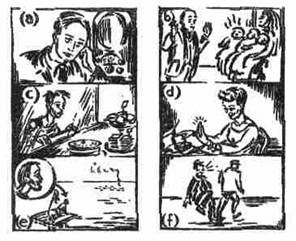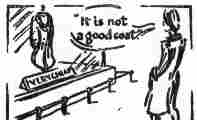STEP 16
Vocabulary
![]() Read and memorize this nouns and adjectives.
Read and memorize this nouns and adjectives.
Nouns
Card |
 |
Idea |
 |
Paper |
 |
Price |
 |
Root |
 |
Seed |
 |
Sleep |
 |
Account |
|
Chance |
|
Committee |
|
Company |
|
Desire |
|
Hope |
|
Interest |
|
Opinion |
|
Start |
|
Surprise |
|
Talk |
|
Adjectives
Cheap - Dear
A TALK IN THE TRAIN
I was tired and had a desire for sleep. For this reason I got into a quiet part of the train. A young woman with an open book in her hand had a seat by the window. She seemed quiet and she did not take hr eyes off her book. "this is good," I said. "I will have a sleep."
But chance was against me. After short time another young woman, with some parcels under her arm and a basket in her hand, came to the door. When she saw only me and one woman through the window, she got in, put her parcels down, and took a seat opposite the first woman. The train made a start and one of the parcels went onto the floor. The first woman took up the parcel, which was near her foot. When she was giving it back to the other woman, she saw her face. She was clearly an old friend. After that I had no hope of sleep. The women had loud voices and their talk kept me awake till the end of the journey. I had no interest in their talk but I will give you an account of what they said.
First Woman [with a look of surprise]: Margaret!
Friend: Mary!
First Woman: This is a surprise! You were in Scotland when your mother gave me news of you.
Friend: Yes, I was in Scotland but I came back when my friend got married.
First Woman: Do you frequently go down by this train?
Friend: No. I come up to town every week on the day when there is a cheap ticket. After going to the stores and getting things for the family. I sometimes go to the pictures and take the last train back. I took an early train this time because there were no good pictures. Are you doing work in town?
First Woman: Yes, I am in the office of a steel company. I come up from the country every day and I go back by this train. Having company on the journey will be a change. Reading in the train makes my eyes tired. I frequently go to sleep while I am reading.
Friend: I have food and drink with me in this basket. Let us have some. (She takes food and drinks out of the basket and gives some to her friend.)
First Woman: That is a very good idea. I did not have time for much food today. What is the news of your family?
Friend: There is not much. Father had a pain in his side last week and we kept him in bed, but he is up again and doing work in the garden. Mother is on almost every committee in the place and her opinions get her into trouble with all of them.
First Woman: When I saw our mother she gave me a long account of an argument she was having with the other women on the Hospital Committee about the bad food.
Friend: She made them do something in the end. After that she had trouble with the Library Committee because the Library was shut in the middle of the day.
First Woman: Where is Betty?
Friend: She is by the sea with some friends. Mother sent her there for a change because she was tired.
First Woman: Is Bob married?
Friend: He is waiting till he gets a house.
First Woman: I saw the girl that day when we went on the river. She is very beautiful.
Friend: She is a sweet girl and Mother and Father have a very hight opinion of her.
First Woman: There is a hole in the parcel which you put under the seat. Some earth is coming through the paper.
Friend: That is the parcel of plants which I got for Father. There is earth round their roots. I will put them in another bit of paper. Father makes me get all the plants and seeds for the garden. Last week I came back with a spade for him.
First Woman: I had a look at the windows of some of the stores this morning. The prices seemed very high.
Friend: They are high for some things but not for everything. Things for the house are dear but dresses are quite cheap. I got a very cheap dress today. But I gave a high price for these stockings for Mother and they are not very good. What is this station? Do you see the name?
First Woman: It is Sandbridge. Do you get out here?
Friend: No, I will go on to Newharbor tonight. Father is waiting for me there. But I will put my parcels together because we will be there in a minute.
First Woman: You will have a long walk from Newharbor to your house with those parcels.
Friend: There is a short way across the fields and Father will take some of the parcels. The walk is good for me. Where is my ticket? I may be among these letters in my bag.
First Woman: Is that it?
Friend: No, that is only a card. Here it is. I put it in my pocket.
First Woman: Come and see me some time and let us have another talk.
Friend: I will.
Notes
![]() Read Carefully, this are some sentences of the text, and here is the explanation form them.
Read Carefully, this are some sentences of the text, and here is the explanation form them.
For this reason: Note this idiomatic use of for, in the sense of 'because of,' before reason.
She seemed quiet: Quiet may be used, as here, in the sense of 'not inclined to talk or be restless or noisy.'
Take her eyes off her book: When we stare at something we may say we keep our eyes on it, and when we cease to look at it, we take your eyes off it.
Have a sleep: A sleep is 'a spell of sleeping, a nap.' Note that have is the operator used with it.
Chance was against me: that is, 'in opposition to, antagonistic to me.' When used figuratively, against something which is pushing from the opposite direction.
Made a start: Note that make is the operator used with start, and that make a start means either 'begin' generally or 'began to go, begin a journey'.
Onto: Note this compound, which is parallel in use to into.
Hope of sleep: The object of an emotion or attitude of mind is sometimes indicated by for (as we have seen in desire for sleep above), sometimes by of. Some nouns of feeling, etc. are used only with of, others only with for, a few with either, and two special cases with neither. Hope is one of the first sorts, desire one of the second.
Interest in: The thing for which interest is felt is pointed to by in. Here is one of the special cases referred to in the last note. Another word you have had that is used with in is pleasure.
An account of: of is used after words like account, news (see news of later in thee Step) in the sense of 'concerning, dealing with'; it is also used very similarly after picture, etc., in the sense of 'representing, depicting', and after look, etc. in the sense of 'indicating' (a look of surprise.).
A surprise: a thing causing surprise.
Go down by this train: Compare with come up to town. One makes a journey down from London or some other big town and up to it. By, in addition to its root sense of 'near to,' is used for pointing to the way in which we do thing, or to the instrument, person or cause which is responsible for them. One may have a walk by the river, or go to a place by river in a boat, or go by boat. In the last two examples, where river and boat indicated the method of traveling and do not stand for any particular river or boat, note that the nouns are not qualified by “a” or “the”.
To town: London or the chief town of the district is referred to as town without the in front of it.
Every week: In is frequently omitted before week and nouns naming longer periods of time in the same way as on may be omitted form morning, day, etc.
Cheap tickets: In England it is customary to issue cheap day tickets once a week to London and other big towns to enable people living in the country to go up and shop.
Take the last train back: You take a train when you travel by it. Compare with take a seat. Note that back here goes with train: 'the last train going back.'
This time: on this occasion. Note the use of time in the sense of 'occasion.' No preposition is used with time in this sense. For another example, see come and see me some time at the end of the Step.
Having company: a company is a group of persons working in association with one another. By expansion the word is used in the send of 'companionship.'
On the journey: When one is making a journey, one is said to be on it.
Go to sleep: fall asleep. Note the idiom.
While I am reading: Reading is an adjective as well as a noun.
Father had a pain : Note that when mother and father are used as titles, that is, in addressing one's own mother and father, or in referring to them without using my, they are spelled with a capital letter. Thus, later in the Step, you will find your mother, but Mother and Father have a very high opinion of her.
Last week: in the week before this week. Note the omission of the before last. Last may be used in this way with time-words, including night, but excluding day or any other division of it.
He is up again: no longer kept in bed by illness.
Doing work in the garden: This does not mean that her father is doing work at the present moment but refers to a wider present in which an act may be in progress in the sense that it takes place from time to time.
On almost every committee: A member of a committee is said to be on it.
Get her in trouble: Trouble is one of the conditions which we may be said to be in. We may also get into trouble or get others into it, as here, though into is not used before all names of conditions which take in.
When I saw your mother: See may be used in the special sense of 'see and talk with, meet socially.' Compare this example with come and see me, at the end of this Step. Come (go) and see is a fixed phrase meaning 'visit.'
About the bad food: About here means 'concerning, in connection with.' This is an important expansion.
In the end: eventually.
A sweet girl: The sense of sweet here is 'pleasant, attractive.'
A very high opinion of her: The thing concerning which one has an opinion may be pointed to by either of or about. When opinion is followed by of, it generally has the sense of 'estimate, judgment.' Anything which is great in degree or amount is regarded as being high (on a scale) and anything which is small in degree or amount as low (on a scale). Prices, for example (see below), may be talked of as high or low.
I gave a high price for these stockings: Note this important use of for in the sense of 'in exchange for.'
Have a look at: With look and certain other words that will be noted later, at is used where one might expect to.
This morning: Note that this is used with morning to indicate 'the morning of today'
Tonight: but not with night, which forms the compound tonight.
Go on: On is used adverbially after go, get, keep, and other appropriate words in the sense of 'forward, farther' or to give the idea of progress or continuation.
Good for me: beneficial to me.
Letters: epistles. A letter in this sense is composed of letters in the root sense (that is, letters of the alphabet).
Have another talk: Have is the operator used with talk.
Exercises
1. This picture illustrates three things that are low. What are they?
1.-
2.-
3.-
2. Describe the different expression pictured below.

(a)
(b)
(c)
(d)
(e)
(f)
3. Fill in the blanks:
(a) Who is _____ the school committee?
A:
(b) Has he much interest _____ new ideas?
A:
(c) She has no hope _____ seeing him again.
A:
(d) They came _____ from town last week and they will go _____ to town again tonight.
A:
(e) I had a look _____ the picture and my opinion _____ it is not good.
A:
(f) If you do not _____ _____ sleep quickly you will be tired in the morning.
A:
4. Answer in Basic:
(a) What kept me awake?
A:
(b) What was against me?
A:
(c) Why did I get into a quiet part of the train?
A:
(d) What was a change for the first woman?
A:
(e) When does the friend come up to town?
A:
(f) What does the mother of the friend do?
A:
(g)Give an account of the things which the friend got in the stores.
A:
(h) Where was her ticket?
A:





